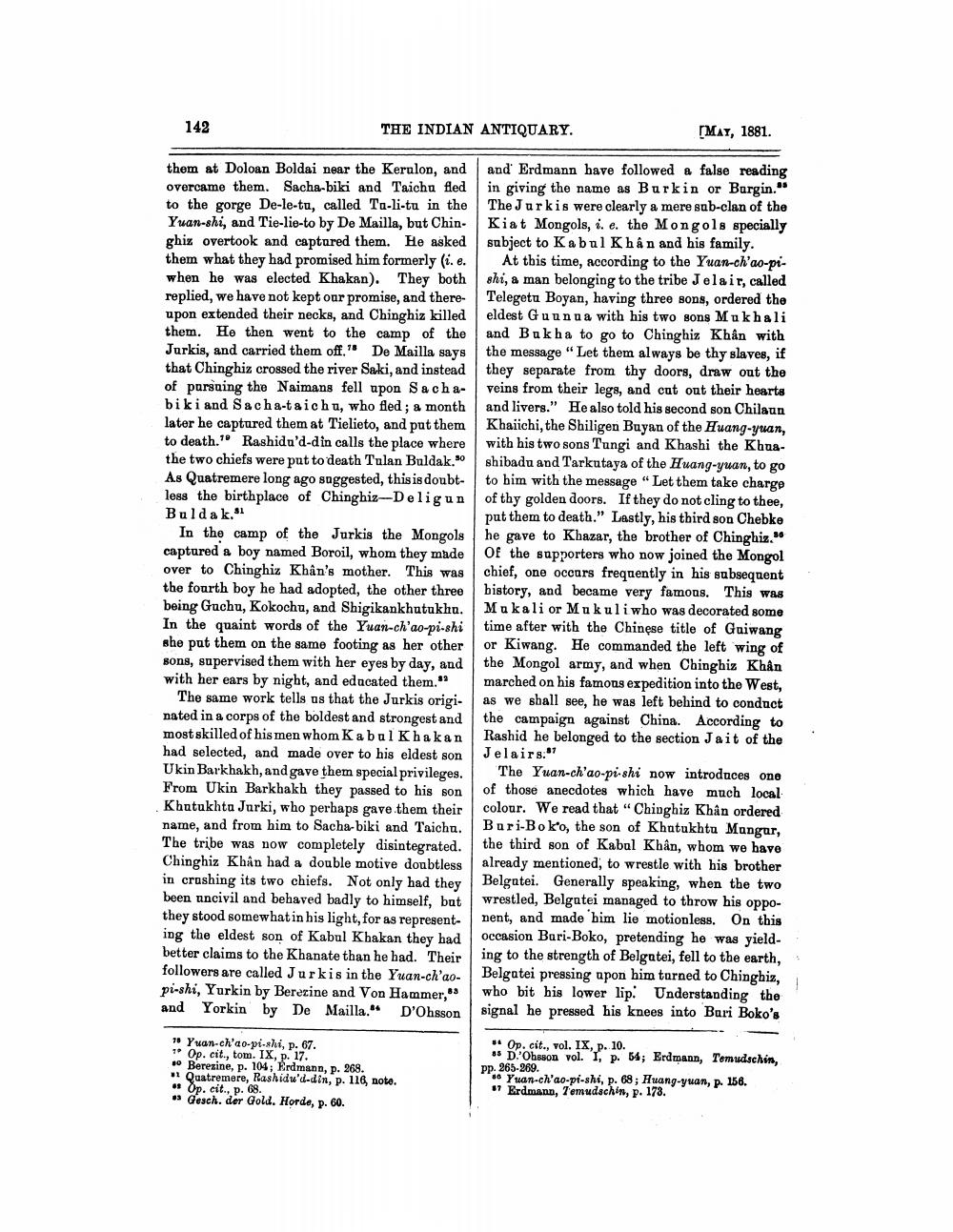________________
142
THE INDIAN ANTIQUARY.
them at Doloan Boldai near the Kerulon, and overcame them. Sacha-biki and Taichu fled to the gorge De-le-tu, called Ta-li-tu in the Yuan-shi, and Tie-lie-to by De Mailla, but Chinghiz overtook and captured them. He asked them what they had promised him formerly (i. e. when he was elected Khakan). They both replied, we have not kept our promise, and thereupon extended their necks, and Chinghiz killed them. He then went to the camp of the Jurkis, and carried them off." De Mailla says that Chinghiz crossed the river Saki, and instead of pursuing the Naimans fell upon Sachabiki and Sacha-taichu, who fled; a month later he captured them at Tielieto, and put them to death." Rashidu'd-din calls the place where the two chiefs were put to death Tulan Buldak," As Quatremere long ago suggested, this is doubtless the birthplace of Chinghiz-Deligun Buldak.
In the camp of the Jurkis the Mongols captured a boy named Boroil, whom they made over to Chinghiz Khân's mother. This was the fourth boy he had adopted, the other three being Guchu, Kokochu, and Shigikankhutukhu. In the quaint words of the Yuan-ch'ao-pi-shi she put them on the same footing as her other sons, supervised them with her eyes by day, and with her ears by night, and educated them.""
The same work tells us that the Jurkis originated in a corps of the boldest and strongest and most skilled of his men whom Kabul Khakan had selected, and made over to his eldest son Ukin Barkhakh, and gave them special privileges. From Ukin Barkhakh they passed to his son Khatukhta Jurki, who perhaps gave them their name, and from him to Sacha-biki and Taichu. The tribe was now completely disintegrated. Chinghiz Khân had a double motive doubtless in crashing its two chiefs. Not only had they been uncivil and behaved badly to himself, but they stood somewhat in his light, for as representing the eldest son of Kabul Khakan they had better claims to the Khanate than he had. Their followers are called Jurkis in the Yuan-ch'aopi-shi, Yurkin by Berezine and Von Hammer, and Yorkin by De Mailla." D'Ohsson
Yuan-ch'ao-pi-shi, p. 67. Op. cit., tom. IX, p. 17.
Berezine, p. 104; Erdmann, p. 268. Quatremere, Rashidu'd-din, p. 116, note. Op. cit., p. 68.
3 Gesch. der Gold. Horde, p. 60.
[MAY, 1881.
and Erdmann have followed a false reading in giving the name as Burkin or Bargin."" The Jurkis were clearly a mere sub-clan of the Kiat Mongols, i. e. the Mongols specially subject to Kabul Khan and his family.
At this time, according to the Yuan-ch'ao-pishi, a man belonging to the tribe Jelair, called Telegetu Boyan, having three sons, ordered the eldest Guunua with his two sons Mukhali and Bukha to go to Chinghiz Khân with the message "Let them always be thy slaves, if they separate from thy doors, draw out the veins from their legs, and cut out their hearts and livers." He also told his second son Chilaun Khaiichi, the Shiligen Buyan of the Huang-yuan, with his two sons Tungi and Khashi the Khuashibadu and Tarkutaya of the Huang-yuan, to go to him with the message "Let them take charge of thy golden doors. If they do not cling to thee, put them to death." Lastly, his third son Chebke he gave to Khazar, the brother of Chinghiz." Of the supporters who now joined the Mongol chief, one occurs frequently in his subsequent history, and became very famous. This was Mukali or Mukuliwho was decorated some time after with the Chinese title of Guiwang or Kiwang. He commanded the left wing of the Mongol army, and when Chinghiz Khân marched on his famous expedition into the West, as we shall see, he was left behind to conduct the campaign against China. According to Rashid he belonged to the section Jait of the Jelairs:7
The Yuan-ch'ao-pi-shi now introduces one of those anecdotes which have much local colour. We read that "Chinghiz Khân ordered Buri-Boko, the son of Khutukhtu Mungur, the third son of Kabul Khân, whom we have already mentioned, to wrestle with his brother Belgatei. Generally speaking, when the two wrestled, Belgatei managed to throw his opponent, and made him lie motionless. On this occasion Bari-Boko, pretending he was yielding to the strength of Belgatei, fell to the earth, Belgatei pressing upon him turned to Chinghiz, who bit his lower lip. Understanding the signal he pressed his knees into Bari Boko's
Op. cit., vol. IX, p. 10.
85 D.'Obsson vol. I, p. 54; Erdmann, Temudschin, pp. 265-269.
se Yuan-ch'ao-pi-shi, p. 68; Huang-yuan, p. 158. 7 Erdmann, Temudschin, p. 173.




